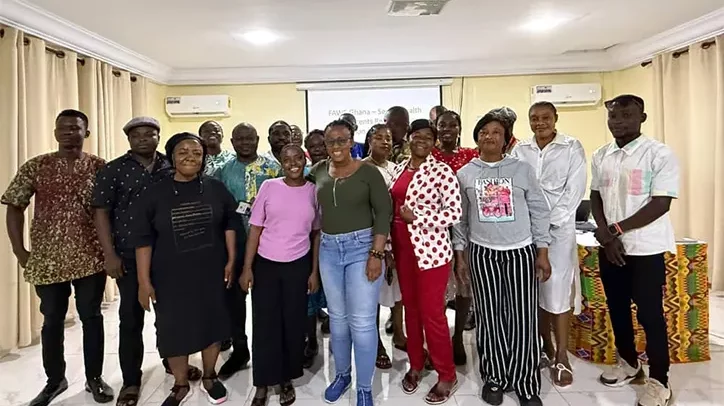In a dynamic step towards tackling adolescent sexual reproductive health challenges in Ghana, FAWE Ghana has successfully concluded a three-day intensive media training for selected journalists in the Upper East Region. The training, took place in Bolgatanga under the flagship SHARE Project (Sexual Health And Reproductive Education).
The initiative, spearheaded by FAWE Ghana in collaboration with consortium partners including Right to Play, WaterAid, and FHI360, focused on empowering media professionals to adopt gender-responsive reporting and become key advocates for Adolescent Sexual Reproductive Health and Rights (ASRHR).
Hands-on Learning and Transformative Dialogue
Led by experienced media and communication consultant Mr. David Kwesi Ghartey-Tagoe, participants were taken through sessions on ethical reporting, storytelling for impact, and crafting media campaigns that drive social change. One of the highlights of the workshop was an interactive simulation where journalists assumed the roles of radio producers, show hosts, and expert panelists, running mock interviews on critical issues such as teenage pregnancy.
“Journalists are very powerful. The stories we tell influence society in profound ways. This training is about equipping the media to report responsibly, highlight the real issues, and help shift public perception,” said Mr. Ghartey-Tagoe, Lead Facilitator.
The final session culminated in participants designing comprehensive ASRHR-focused media campaigns, integrating tools of strategic communication, community engagement, and policy advocacy.
Addressing Real Community Challenges
According to Elikem Katsekpor, Project Officer for the SHARE Project at FAWE Ghana, the goal is not just about youth education but empowering parents and caregivers to be active participants in the dialogue on sexual and reproductive health.
“The SHARE project is basically aimed at addressing issues on sexual health and reproductive education, especially amongst young people. But we want to empower parents to have these conversations at home,” Mr. Katsekpor stated.
“In our four districts, Bongo, Kassena-Nankana Municipality, Kassena-Nankana West, and Builsa North, we’re training parents and communities on gender equality, harmful traditional practices, and drug abuse, which are all interconnected with the issues of teenage pregnancy and reproductive health.”
He emphasized alarming trends such as increased teenage pregnancies, drug abuse, and misuse of emergency contraceptives due to poor access to accurate sexual health education, and ties them directly into the purpose of the media training under the SHARE Project:
“We are increasingly alarmed by the rising cases of teenage pregnancies, drug abuse, and the misuse of emergency contraceptives, all symptoms of a deeper issue: the lack of accurate, accessible sexual and reproductive health education. Through the SHARE Project, FAWE Ghana is working with journalists to amplify these critical issues and promote informed, gender-responsive storytelling that drives real change. The media holds the power to shift mindsets, spark dialogue, and hold duty bearers accountable, and that’s exactly what this training is preparing them to do.” – Elikem Katsekpor, Project Officer, SHARE Project – FAWE Ghana
Journalists Speak: A New Perspective
The training wasn’t just theoretical, it left a strong impression on participants.
Nicholas Azebire of Dreamz FM, Bolgatanga, noted the transformative nature of the program:
“You’d think it’s going to be like any other workshop. But this one is different, it’s hands-on. It’s practical. And that’s what sets it apart. Now it’s up to us to translate this knowledge into better reporting that truly impacts our communities.”
Philomena Aboko from Nabina FM in Navrongo shared a candid reflection:
“We thought we knew it all, but this workshop has been a real eye-opener. Especially the interview skills, how to plan, research, and stay time-conscious. It’s changed how I will approach my interviews moving forward.”
From Training Room to Community Impact
The SHARE Project aims to extend beyond the walls of the training venue. By equipping journalists as frontline advocates, FAWE Ghana hopes to spark broader public engagement, encourage responsible parent-adolescent dialogue, and hold policymakers accountable for inaction in key areas of adolescent health.
“If journalists consistently tell these stories, about girls facing abuse, boys dropping out for Galamsey, or the realities of drug abuse, it forces society and policymakers to take notice,” said Mr. Ghartey-Tagoe. “We need consistent, informed, and sensitive reporting.”
Looking Ahead
As the journalists prepare to roll out their individual ASRHR media campaigns in their respective stations and platforms, the message is clear: the media has a critical role in shaping the future of adolescent health and gender equality in Ghana.
FAWE Ghana, through the SHARE Project, is not just investing in knowledge but in the power of storytelling to drive real change; one broadcast, one article, one community at a time.
From Ebo Bruce-Quansah, Bolgatanga


